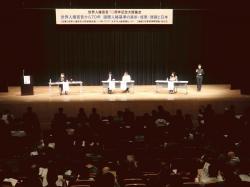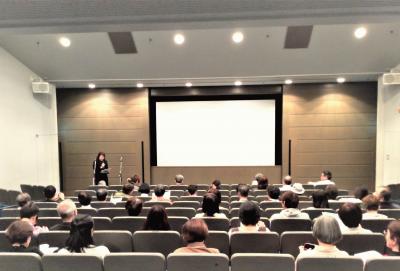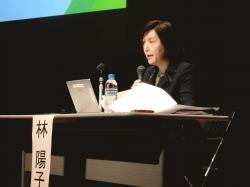- TOP
- 国際人権基準の動向
- FOCUS
- December 2018 - Volume 94
- HURIGHTS OSAKA Activities
FOCUS December 2018 Volume 94
HURIGHTS OSAKA Activities
HURIGHTS OSAKA organized several events in 2018 to celebrate the 70th anniversary of the Universal Declaration of Human Rights (UDHR), as well as to raise awareness of human rights. A film screening event and a symposium were held to attract people among the events.
Human Rights Film Screening
HURIGHTS OSAKA screened on October 13 and November 11, 2018 in Osaka city five human rights-related films, aiming at encouraging people to have a personal “feel” for human rights by watching films on specific issues that both inform and entertain them. The five films were about a community-based nursery in a district of Osaka city where daily workers live (Satoni Kitara Eeyan – a documentary), a Saudi girl’s struggle to do what she wanted including riding a bicycle (Wadjda), a teenage girl’s story about discrimination against her indigenous community in Sweden in the 1930s (Sami Blood), a film based on a true story of a French teacher who challenged her “difficult” students to change their indifference towards the Holocaust (Once in a Lifetime), and a Syrian refugee in Finland who was befriended by a Finnish salesman (The Other Side of Hope). More than two hundred people joined the two-day event. The participants were satisfied with the films and commented positively on the event overall by requesting similar events to be held in the future and by stating that it helped them to have better understanding about the specific topics of the films.
Symposium on the 70th Anniversary of Universal Declaration of Human Rights
In collaboration with the Osaka Liaison Conference for the Universal Declaration of Human Rights, HURIGHTS OSAKA held a symposium on 5 December 2018 in Abeno Kumin Center in Osaka city. The symposium constituted two major sessions in order to look into the role that the UDHR played in the last seventy years and the future issues toward the realization of human rights in the 21st century.
In the first session, Yoko Hayashi, a lawyer and a member of the United Nations Committee on the Elimination of All Forms of Discrimination Against Women, gave the keynote speech. She explained the history on the adoption of the UDHR, and how international human rights laws have been gradually recognized as “a living instrument”. Then she pointed out some ongoing issues and challenges in establishing infrastructures for ensuring human rights in Japan - such as the absence of a national human rights commission and the individual communication mechanism under United Nations human rights treaty monitoring system. A panel discussion followed as the second session on intersectional discrimination through the gender perspective with three speakers discussing different topics, in order to dwell on issues and tasks that remained to be addressed regarding the rights of minority persons in Japan. Wooja Kim, Associate Professor of Ritsumeikan University presented the results of a survey on discrimination that Zainichi (resident Korean) women face as a social minority. Ippo Tanaka narrated his personal journey from his career in a nursery, to his past life as a female, to his life as a Buraku person and to his current engagement in the education of children of members of the sexual minority. Kumiko Fujiwara explained the activities of the DPI (Disabled Peoples' International) Women's Network Japan as a head of the network. Around four hundred people attended the symposium.
 Panel Discussion Panel Discussion |
Keynote Speech, Yoko Hayashi |


